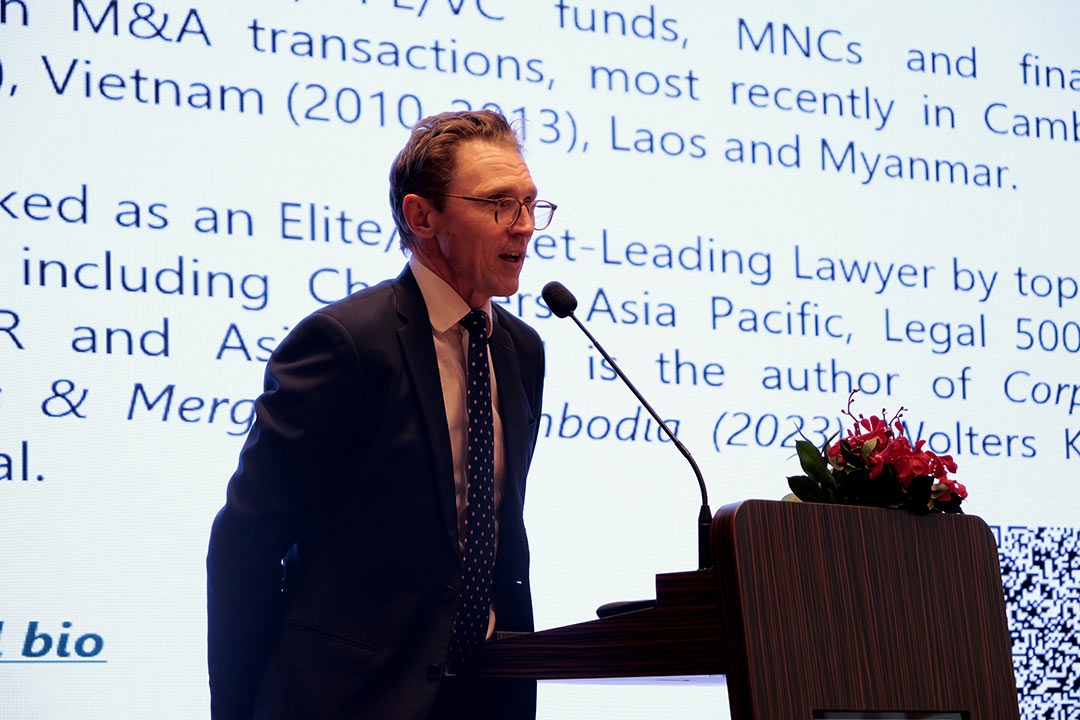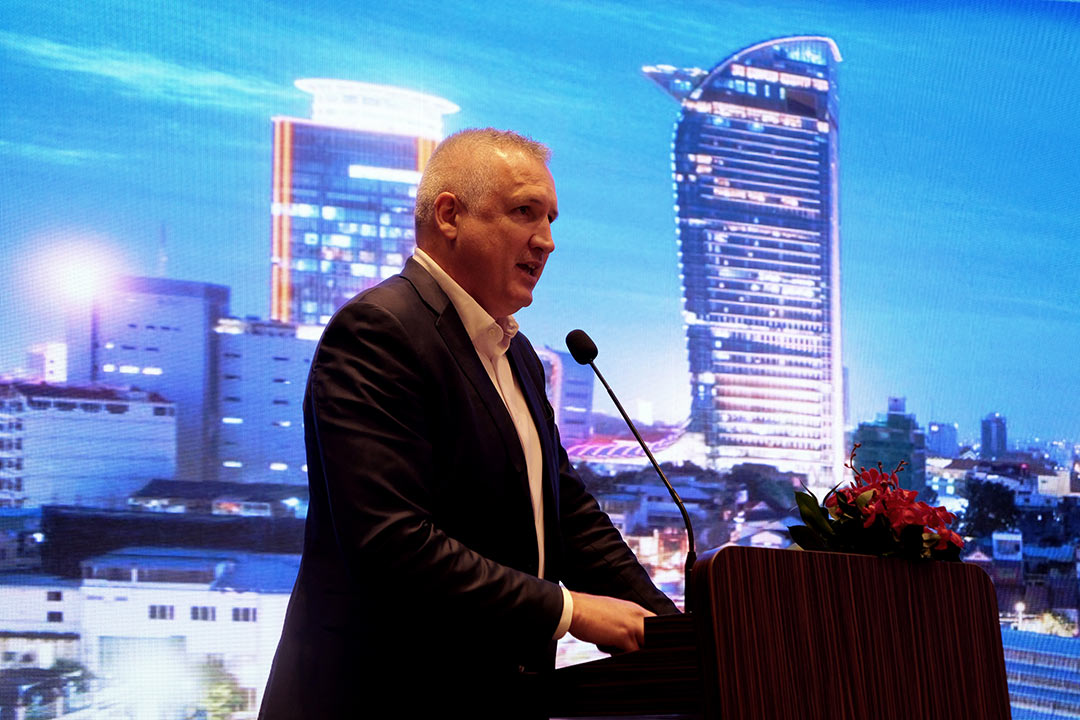Cambodia M&A Spotlight: Geopolitical Uncertainties Likely to Curtail Short-Term Gains, but Rising Global Interest and Long-Term Growth Is Evident

EuroCham Cambodia and DFDL Cambodia hosted ‘Cambodia M&A Forum 2025’ on August 14, gathering key experts from the legal and business community to discuss the current economic situation in Cambodia and the latest updates in the mergers and acquisitions (M&A) landscape.
The forum opened with a presentation from Chris Robinson, Partner and Head of Regional Corporate Mergers and Acquisitions at DFDL, on key trends in the regional and global M&A market.
He explained that M&A activity has gone up and down dramatically in recent years due to disruptive factors like the COVID-19 pandemic, rising interest rates and inflation, and ongoing geopolitical tensions.
“Deal value as a percentage of global GDP is actually the lowest level that it's been in 30 years, which is quite telling for the state of the current M&A market,” said Robinson. “As you would have seen from media reports in recent years, those deals are really concentrated in a couple of sectors, specifically financial services, telecommunications and also energy. We've also seen historically lower valuations because there's much more caution out in the market.”
Additionally, Robinson explained that a lot of activity and interest that was previously coming from Chinese investors—as seen in Cambodia particularly around 2016-2017—has diminished in recent years, as China has become more focused on its internal affairs.
There's also quite a lot of competition at the moment for capital. In the past, a lot of growth has been driven by M&A activity, but in recent years, there's been a lot more focus on investment in technology and, specifically, AI, and that's really competing with capital that might otherwise have been injected into M&A deals.
In terms of what lies ahead, Robinson said there are a lot of wild cards and clouds in the horizon, as made clear by the ongoing trade war and rising geopolitical tensions between the U.S. and China.
Cambodia’s Developing M&A Market
A number of significant M&A deals have been made in recent years in Cambodia, giving an idea to how much the market has grown and developed. Robinson highlighted the merger of Kookmin Bank Cambodia with PRASAC MFI, as well as Bank SinoPac Ltd.’s acquisition of Amret MFI, as two notable examples from the financial sector.
There has also been a significant rise in investment from private equity, notably from Navis Capital Partners in 2020, when they acquired a controlling stake in CIA, following their investments in Orchid Hospitals.
“In terms of other trends, we've seen a rise in sophistication of deals,” said Robinson. “Grab acquired Nham24 at the end of last year, which is really one of the most transformational deals for the local VC (venture capital) sector and startup scene.”
In a comment shared with B2B Cambodia, he further added that this deal points to how Cambodia’s consumer sector is now firmly on the radar for regional tech and platform players, as well as venture capital funds.
Cambodia has moved from being a purely frontier market to one where strategic acquisitions are used to quickly gain market share, especially in the fast-growing consumer-facing sectors, such as delivery, FinTech and e-commerce. The deal also reinforces that foreign acquirers are becoming increasingly confident about acquiring local champions, as they are better positioned to build tailored offerings to meet local demand.
“Finally, the deal highlights that Cambodia’s youthful, urban and connected consumer base is seen as a valuable growth market within Southeast Asia. Going forward, we can expect to see more strategic inbound acquisitions, alongside ongoing private equity interest as the Cambodian market continues to mature,” Robinson concluded.

Cambodia Economic Review in Light of Border Conflict – Will The Country Face a Recession?
Stephen Higgins, Managing Partner at Mekong Strategic Capital (MSC), provided an overview of the current economic situation in Cambodia, particularly in light of the border conflict with Thailand.
“The Thai border conflict—big, big issue for the economy. It's going to have a major short-term economic impact over the next 12 months,” stressed Higgins.
He shared that MSC now projects about a three per cent GDP growth for Cambodia in 2025—down from six per cent projected in the first half of the year—and a likely three per cent growth again in 2026, due to the negative impact the border conflict has had on remittances, supply chains, tourism and foreign direct investment (FDI).
WATCH: Cambodia and Thailand Likely to Face Recession - Impact of
Border Conflict - Stephen Higgins
“If [growth in] the first half was six per cent, and we expect an average of three per cent, that implies second half growth of zero. We expect something similar next year, first half growth of around zero, before rebounding pretty quickly in the second half again for an average of about three,” said Higgins.
So that's about 12 months of what we think will be close to zero growth. That is a recession that we will have with a very high degree of certainty long term.
“And Thailand, on the other side of the border, also faces a recession. With their starting point of 1.8 per cent of GDP growth, they don't have to drop far to go into a recession,” he added.
Commenting on how this has impacted the M&A market specifically, Higgins shared that MSC has already seen a number of large sell side M&A mandates get deferred or fall apart. However, equally, on the buy side, opportunities seem to be rising with some seeing this as a good time to buy.

To get through these times of economic uncertainty, Higgins stressed the need for the Cambodian government to push forward on fiscal stimulus, start investing in infrastructure to get money into the economy, go harder on reform, and market the country much better than they have in the past. Fortunately, he believes the government has got the fiscal space and ability to do so.
Cambodia's government debt is one of the lowest in the world. There are nine countries at Cambodia's level of development that have lower debt, and five of those are petrol states like Brunei. So, Cambodia is in an incredibly fortunate position, thanks to a long period of strong fiscal discipline by the government, to start using that flexibility to support the economy.
While Cambodia faces short-term losses, Higgins emphasised that MSC is optimistic about the country’s long-term growth from 2027 and beyond.
“For existing investors, the next 12 months will hurt, but for those looking to invest, there's actually some pretty good upside,” he said. “For people looking to invest in Cambodia, it's actually a great time to do it, because by the time you invest, you're going to be on the upward path, and the outlook is still bright long-term.”